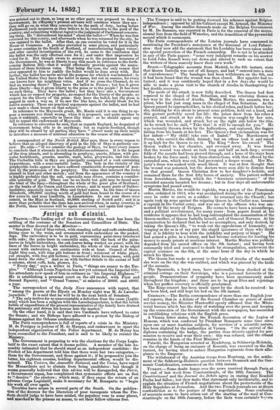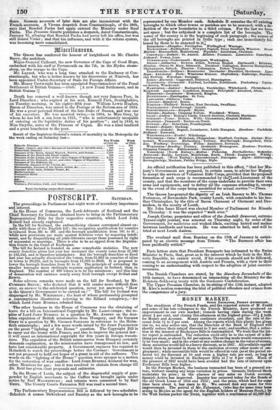jurtigu Ruh tfilunial.
FRANCE.—The leading act of the Government this week has been the 'settling of the costume of the Senators and Councillors of State. The matter is thus decreed in the Honiteur- "Senators : Coat of blue velvet, with standing collar and cuffs embroidered, fitting close to the waist, and ornamented with embroidery on the pocket- flaps. The embroidery is to be in gold, representing palm-trees interlaced with oaks ; the palm-trees in cannetille mate, with the back of the palm- leaves in bright embroidery, the oak-leaves being worked au passé, with the lines of the leaves in bright embroidery, the whole of the coat to be edged round with embroidery, six centimetres wide at least. Council of State : Light blue coat, with nine gilt buttons in front ; waistcoat of white pique, cut straight, with fine gilt buttons; trousers of white kerseymere, with gold band down the sides." And so on with further details to the extent of half a column, about cuffs, hats, plumes, &c. " Every day," says a writer in Paris, " things are nearer to the Em- Tire." " Although Louis Napoleon has not yet assumed the Imperial title, his attendants now speak of him in ordinary as his Imperial Highness.' " He is establishing a personal court on the old model, with First and second Equerry, and " Grand Veneur," at salaries of 3000/. and 40001. a year.
The correspondent of the Daily News announces with regret, that 4' among the guests at the Elysee on Monday night was M. de Laroche- jaquelein." It is said that he will be in the next batch of Senators. The only motive for so unaccountable a defection from the cause [Legiti- mist] which has been a religion with the Larochejaqueleins, is that the lavish habits of expenditure of the present representative of the family have drained his patrimony and driven his honour into the market."
On the other hand, it is said that two Cardinals have refused to enter the Senate; and six Bishops have adhered to a protest by the Bishop of Rennes against the Orleans confiscations.
The Paris correspondence is full of reports of a crisis in the Ministry. M. de Persigny is jealous of M. de Maupas, and endeavours to upset the independent organization of the Police department. M. de Moray has been reconciled to the President, and is said to be likely to reenter the Minis
The Government is preparing to win the elections for the Corps Legis- latif to the exact extent that it deems politic. A member of the late As- sembly intimated that he should stand as an independent candidate : the Prefect of his department told him that there were but two categories,— those for the Government, and those against it; if he proposed to join the latter, his eighteen cousins, holding departmental offices, would be dis- missed. The Univers, the Assemblie National, and the Union, have urged the Monarchists not to abstain from being candidates : but though it seems generally believed that this advice will be disregarded, the Patric, a Government organ, has complained that systematic efforts are on foot to " deceive " the electors ; which may, if they cause the return of an adverse Corps Legislatif, make it necessary for M. Bonaparte to "begin his work all over again."
Troubles have arisen in several parts of the South. On the publica- tion of the decrees for the liberation of poor insurgents whom the Pre- fects should judge to have been misled, the populace rose in some places, and marched to the prisons en masse, to set their fellow citizens free.
The Usurper is said to be putting forward his schemes against Belgian independence ; opposed by all his Cabinet except St. Arnaud, the Minister of War. Among the snuiller demands made on the Belgian Government by M. De Bassani), one reported in Paris is for the removal of the monu- mental lion from the field of Waterloo, and the demolition of the pyramidal mound which it surmounts.
The. Paris correspondents of the London journals have concurred in mentioning the President's annoyance at the dismissal of Lord Palmer- ston : they now add the statement that his Lordship has been taken under the special protection of the French censorship. He is not to be attacked in any of the Paris papers : "some very indulgent remarks on his answer to Lord John Russell were cut down and altered to such an extent that the writers of them scarcely knew their own work."
SPAnr.—Telegraphic accounts from Madrid, to the 8th instant, state that Queen Isabella was out of all danger, and had " entered into a state of convalescence." The bandages had been withdrawn on the 6th, and it had been found that the wound was then closed. Her appetite had re- turned; and it was confidently hoped that in a few days she would be able to make a pious visit to the church of Atocha in thanksgiving for her double recovery.
The mode of the attack is now fully described. The Queen had first repaired to the chapel of San Sebastian, and was returning thence on her way to the church of Atocha. Martin Merino, the assassin, was a priest, who had just sung mass in the chapel of San Sebastian. As tho Queen passed he approached her, in his clerical robes, and knelt before her; she, thinking he was about to present some petition, held out a hand, and this gesture probably saved her life : the priest drew from his robes a poniard, and struck at her side ; the weapon was caught by her arm, which was wounded, and struck her on the right side below the ribs. As he struck her he said, " Take that ! it will be enough for you." He was instantly thrown down by the halberdiers, and captured, the dagger falling from his hands at his feet. The Queen's first exclamation was for her infant—" My child ! take care of Isabel." The Marchioness of Fever, who carried the child, fainted; but an officer took it and raised it up high for the Queen to see it. The King " drew his sword." The Queen walked to her chamber, and swooned away. It was found that the wound was about an inch long and half an inch deep ; several folds of the mantle had been pierced through, and a bone of the stays been broken by the force used ; but these obstructions, with that offered by the extended arm, which was cut, had prevented a deeper wound. Her Ma- jesty's dress was soaked with much blood. It was at first thoulTht that the wound was poisoned, but the doctors were soon able to dismiss fears on that ground. Queen Christina flew to her daughter's bedside, and remained there for the first fifty hours of anxiety. The patient suffered from feverishness, during which the " ferocious countenance" of the intended assassin haunted her dreams ; but in four days all unfavourable symptoms had passed away. Martin Merino, the would-be regicide, was a priest of the Franciscan order, ordained in 1813, who was secularized during the war of independ- ence in order to serve as a soldier : he returned into the Church ; but again took up arms against the reigning Queen in the Carlist war, became a captaiit in the Carlist army, and was one of the officers who was am- nestied by the treaty of Bergara. He seems to have been a misanthrope, and a political revolutionist, for many years : from papers found at his residence it appears that he had long contemplated the assassination of the Queen-mother, of Queen Isabella herself, and of General Narvaez. At his examination he declared that he had no accomplices) and only desired, by tracing the Queen's life, " to wash out the opprobrium of humanity, re- venging as far as is of my part the stupid ignorance of those who think that it is fidelity to bear with the infidelity and perjury of kings." He had gained a prize in a lottery, and had become notorious for lending his money to needy priests at usurious interest. Martin Merino was publicly degraded from his sacred offices on the 5th instant; and having been summarily tried and sentenced to death by strangulation, underwent the capital sentence on the 6th, at the same hour of the day in which ho struck his Queen.
The Queen has made a present to Our Lady of Atocha of the mantle she wore on the day she was stabbed, and which was pierced by the knife of the assassin.
The Spaniards, a loyal race, have universally been shocked at the criminal outrage on their Sovereign, who is a personal favourite of the people. Demonstrations of sympathy have been spontaneously made throughout the kingdom; and there are to be at fetes and rejoicings when her perfect recovery is officially proclaimed. The King-consort has been much upset by the shock he received: ho has been bled, and still kept his bed on the 6th instant.
GERMANY. —The Berlin correspondence of more than one English jour nal reports, that in a debate of the Second Chamber on grants of secret service money, the Minister Manteuffel openly affirmed that the Minis- terial bureau which has the duty of watching over the press and keeping up the connexion of the Government with the newspapers, has succeeded in establishing relations with the English press.
A Vienna letter states, that the French decoration of the Legion of Honour, which was conferred by President Bonaparte some time since upon one or more Austrian subjects, for services of a scientific nature, has been slighted by the authorities at Vienna. " On the arrival of the diploma containing the badge, the parties thus deo:sires applied for per- mission to receive and wear their own : this was refused, and the riband remains in the hinds of the First Minister."
Patacki, the Hungarian arrested at Rendshurg, in Schleswig-Holstein, on the charge of being an emissary of Kossuth, was executed on the 6th instant, for having tried to seduce Hungarian regiments from their alle- giance to the Emperor.
The withdrawal of the Austrian troops from Hamburg, on the settle- ment of the Schleswig-Holstein question between Denmark and the Ger- manic Confederation, commenced on the 10th instant.
TURKEY.—Some doubt hangs over the news received through Paris at the end of last week from Constantinople, of the 26th January. The Constitutionnel and the Journal des Debate agree in stating that Resehid Pacha had fallen ; but they make that statement only incidentally, and to explain the situation of French negotiations about the protectorate of the Holy Sepulchre at Jerusalem. And the two French journals are at direct contradiction as to the posture of those negotiations. Some confusion of accounts seems to have arisen out of the starting of the mail at Con- stantinople on the 26th January, before the facts were certainly It7:_wn There. German accounts of later date are also inconsistent with the French accounts. A Vienna despatch from Constantinople, of the 28th, says that Resehid Pacha had again entered the Ministry under Rauf Pacha. The Prussian Gazette publishes a despatch, dated Constantinople, January 31, alleging that Resehid Pacha had never left his office, but was still Grand Vizier ; and that his influence, and with it the reform system, was becoming more consolidated.



























 Previous page
Previous page